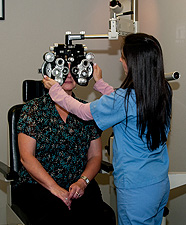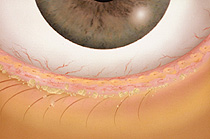Eye Conditions
Are Your Eyes Feeling Their Age? – Age Related Eye Problems
Age related eye problems can weaken your vision, but there are things you can do to maintain lifelong eye and overall health.
Read more on 50plus-today.com
Cataracts
Cataract surgery is the most commonly performed procedure in the U.S., replacing the cloudy natural lens of the eye with a clear artificial lens called an intraocular lens (IOL). Cataracts affect millions of people each year, including more than half of all Americans over the age of 65, and cause a progressive, painless loss of vision. Cataracts also commonly cause blurred or hazy vision, a sensitivity to glare or a feeling of having a “film” over the eyes.
Glaucoma
Glaucoma is a leading cause of blindness in the U.S. It is a form of damage to the optic nerve of the eye. The condition often develops over many years without causing pain or other noticeable symptoms – so you may not experience vision loss until the disease has progressed. People at high risk include those who are over the age of 40, diabetic, near-sighted, African-American, or who have a family history of glaucoma.
To detect glaucoma, your physician will test your visual acuity and visual field as well as the pressure in your eye. Regular eye exams help to monitor the changes in your eyesight and to determine whether you may develop glaucoma. Once diagnosed, glaucoma can usually be controlled and further vision loss can be decreased. Treatments to lower pressure in the eye include non-surgical methods such as prescription eye drops and medications, laser therapy, and surgery.
Macular Degeneration

Diabetic Retinopathy
Diabetic retinopathy is a complication of diabetes that weakens the blood vessels that supply nourishment to the retina inside the eye. These weak vessels can leak, causing a loss of vision. Changes to your vision may not be noticeable at first. But in its advanced stages, the disease can cause significant and irreversible vision loss. Fortunately, diabetic retinopathy is preventable by controlling blood sugar. Prevention is the best medicine with this disease. Regular eye exams are very important to detect diabetic retinopathy. Although damage caused by diabetic retinopathy cannot be corrected, patients diagnosed with the condition can be treated to slow its progression and minimize further vision loss. Treatment modalities include laser and surgical procedures.
Dry Eyes
A common condition in which the eyes produce an abnormally low volume of tears. Tears function to keep the eyes comfortable, clean, and well lubricated. Without adequate tears, the eyes feel dry, gritty and itchy, have a burning sensation, and are often painful. Eyelids may feel heavy, vision may be unclear, and may intermittently tear. Symptoms are often worse after prolonged use and in conditions of heat, wind, and low humidity.
Blepharitis

Newman & Taub Vision Center
To learn more about dry eye treatment, call Newman, Taub & Chu Eye Center today at 972.392.2020


